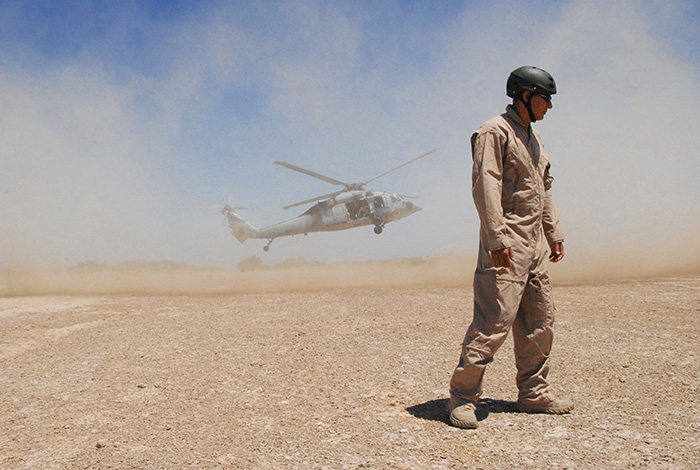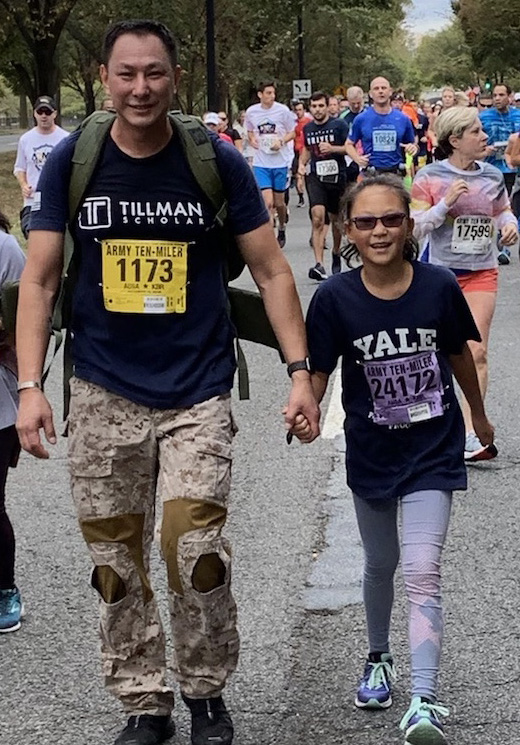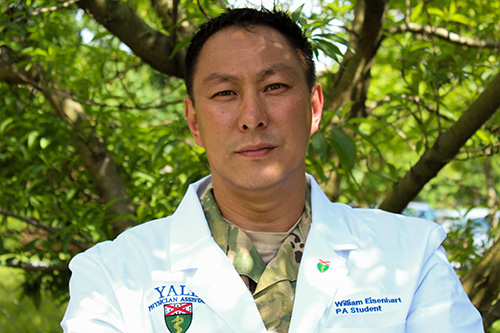Servicemember Called to Serve as a PA: William Eisenhart
What It’s Like to be in PA School and on Active Duty
November 10, 2020

By William Eisenhart, PA-S
I was born in South Korea and came to the U.S. as an infant. I grew up in a small town that did not have many Asian families so we were different. I learned to embrace being different and was not afraid to do things that were not the norm for my family. I became the first person in my family to graduate from college. I went on to get my master’s and thought I would work for one of the big consulting firms. I went into computers instead, where I became a backbone-systems engineer, working with Cisco routers. I had a good job in the Northern Virginia internet corridor and felt good about where things were with my life. Then, September 11, 2001 happened. I sat at home feeling helpless. I went to the recruiters and enlisted in the Navy.
[Wherever you want to go in your career, AAPA can help – join or renew your membership today]
Serving in Iraq and the Army National Guard
I became a member of the Navy’s Explosive Ordnance Disposal teams, where I disarmed roadside bombs in Iraq. The most rewarding moment of my military career was in 2008, where we cleared improvised bombs from an Iraqi village. We were high-fiving the kids there when we completed our mission, making it safe to for them to play in their village.
I left the Navy because I was at the end of my contract and had a newborn daughter. I became an intelligence and counter-terrorist analyst for the Department of Defense, but soon realized I missed the camaraderie of the military. I left the intel sector and joined the Army National Guard as a Special Operations Combat Medic assigned to a Special Forces team. I chose that role because I saw the injuries sustained in combat to civilians and military overseas in a warzone. I wanted to be able to help and learn more about medicine. After nine years in the Army National Guard, I realized I wanted to be an officer in the U.S. Navy so I switched back this summer and was assigned to an Expeditionary Medical Unit.
[How a Helicopter Crew Chief and Bioterrorism Expert Ended Up a PA]

Becoming a PA while in the military
I loved my role as a Special Operations Combat Medic but there was no translation to the civilian world without further education. I had worked with PAs in the military and decided to spend two years doing pre-requisites, which meant spring, summer, and fall with a full course load so I could meet the requirements to apply PA programs. I was accepted and started at the Yale School of Medical PA Online Program in January 2019. There were times when I was in training with the military in the desert or conducting helicopter operations with my teams, then head to a tent or coffee shop to knock out schoolwork. I enjoyed every chance I got with my wife and daughter, but it was never without a laptop, iPad, or textbook beside me. My daughter has gotten used to me sitting at her swim meets with my laptop, PANCE Prep Pearls book, or my headphones in listening to podcasts as I cram for an end-of-rotation exam.
I was on active duty during didactic year and it was tough. My first midterm grades really highlighted the need to really be efficient with my time. I found ways to maximize my time: I would get to work early and jog listening to Brian Wallace with his PA Exam Review podcast or listen to lectures. During the day, I would scramble to various areas of my workplace so I could participate in patient-based learning Zoom calls. I would often get interrupted in one room by an incoming meeting and scramble to find another. When my classmates would have a week off or holidays off, I would be relieved that I could just focus on my role in the military. It was a lot.
I had to come off active duty orders when clinical rotations began. The military had hoped I could fulfill a position on the watch desk on the night shift after a day of rotations, but I didn’t feel I could provide quality patient care or do my role in the military splitting time. I needed to focus on being the best healthcare provider for my patients. I now have drill weekends and training obligations for the military, and though it takes time away from studying and family, it is much more manageable. Luckily, my wife and daughter both understand the life of a PA student and are very supportive.
I hope to commission in the military and be a mentor to my corpsmen and medics while providing care to servicemembers, their dependents, and veterans. I want to continue to work on increasing the diversity of PA students, PA programs, and military PAs. In the 19 years that I have been in the military, I have seen positive impacts that have come from increased diversity. Women are serving in Special Operations and on submarines, and sexual preference or orientation is no longer disqualifying.
[The Case for Inclusion and Diversity in PA Cohorts]
Helping veterans
I am fortunate to work some amazing individuals and veterans organizations. I am particularly focused on helping veterans transition into higher education. I have been fortunate to work with RADM Michael Milner, DHSc, PA-C, USPHS (Ret.), Johnnie Gilpen, PA-C, and Richard Tang, PA-C, with the AAPA Veteran’s Caucus. The first PAs were Vietnam veteran medics and corpsmen that had a unique skill that didn’t translate to the civilian sector, like my dilemma several years prior. I also work with Yale’s Veterans programs to engage with and help veterans currently enrolled at Yale and the Yale School of Medicine. And I am working with the Special Operations Medic Coalition (SOM+C) as they try to educate medical programs around the country and increase general awareness of the capabilities of Special Operations Medics (my own former role) and their potential to positively impact civilian medicine.
[VA Implements Competitive Pay, Other Advances in PA Practice]

“It is worth it”
I have no regrets about my journey to PA school. I had a good job in telecommunications but knew that I was doing the right thing when I enlisted in the military after 9/11. I felt the same way when I left my job as a DOD intelligence analyst to return to the military. It was harder for me to return to PA school – I was 20 years out from my master’s degree and one of the older students in my cohort – but I was committed to becoming a PA. It took two years of classes to complete prerequisites, working nights in an emergency department to get patient hours, and then the challenges that came with being in PA school and on active duty. It is worth it because the moments where I can help another person make all the sacrifice meaningful. It can be daunting to think about a career in medicine with the requirements, cost of education, and now, being in a COVID environment, but being there for people when they need help is a great experience.
William Eisenhart is a Pat Tillman Foundation Scholar and a second-year PA student at Yale School of Medicine PA Online Program. He is also a member of the House of Delegates (HOD) Student Delegation. William can be reached at [email protected].
You May Also Like
Student Member Resources
How a Helicopter Crew Chief and Bioterrorism Expert Ended Up a PA
The Case for Inclusion and Diversity in PA Cohorts
Thank you for reading AAPA’s News Central
You have 2 articles left this month. Create a free account to read more stories, or become a member for more access to exclusive benefits! Already have an account? Log in.



